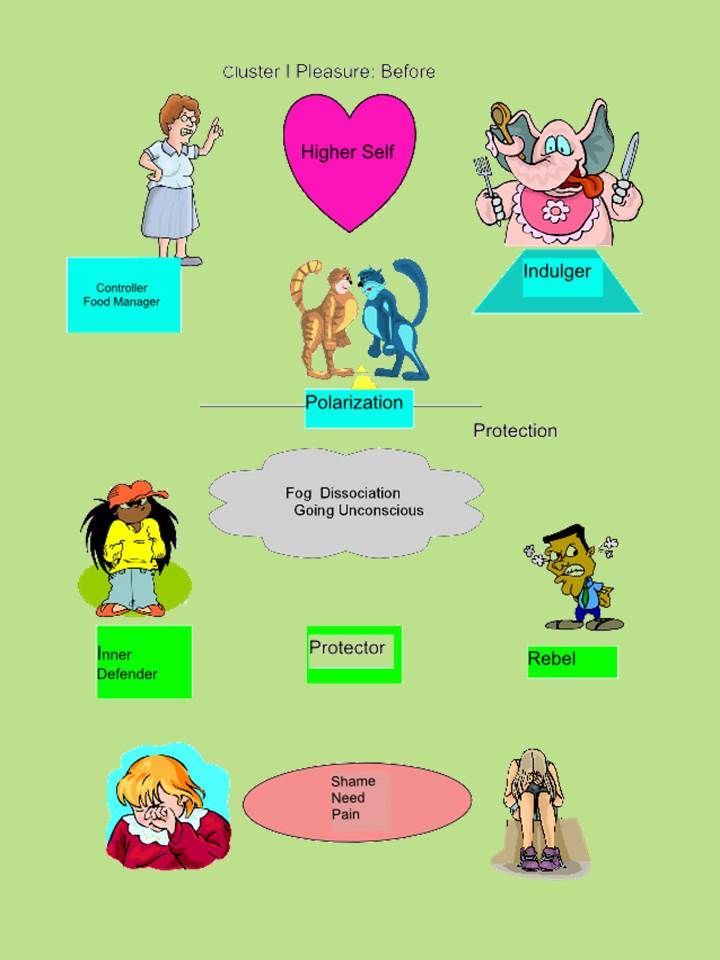Food Addiction: Typical Cluster of Parts
Bonnie Weiss, LCSW
We have studied the
issue of food addiction and found that there are a number of regularly
identifiable parts that make up the Eating Cluster. These parts also
apply to other addictive issues such as substance abuse, gamboling sex
or shopping addiction. An important dynamic in any addiction is the
relationship between the part that engages in the addiction and the
Inner Critic part that tries to control the addiction. We call the
addictive part the Indulger and the Inner Critic part the Inner
Controller. These two parts are polarized, which means they are in
constant conflict with each other. In this case the conflict is about
how much to indulge in the addiction.
It
is important to remember that in the Internal Family Systems model
(IFS) that protector parts are working to in the service of the system.
They have a strategy for trying to help, and a positive intention for
you. They work to protect the more vulnerable exiled parts, and try to
keep their pain from surfacing.

The Inner Controller
tends to be rigid and punitive. It usually has fixed and precise
standards for how you should live. It may have an opinion about exactly
how much you should eat, what you should eat, when and with who you
should eat etc. (This goes for any addiction: e.g. drinking, how you
express your sexuality, spend money, etc.) It tries to control your
behavior in these areas by telling you what to do and criticizing you
whenever you overstep or ignore its rules. Following its dictates can
generally keep it at bay, but if you get out of line, then it attacks
furiously.
There are two problems
with the Inner Controller. One is that its standards are often too
extreme and rigid. The second is that it tries to enforce these
standards by attacking and shaming you when you fail to measure up to
them.
The Inner Controller is
in conflict with the Indulger, which habitually overindulges, in this
case with food. Both parts can be considered Protectors in IFS terms.
This means that each is trying to protect a younger part, or exile,
from coming to consciousness and flooding the system with its pain. The
Controller is often protecting a part that feels rejected and wants to
fit in and be accepted. The Controller may be trying to enforce societal
standards of physical acceptability by controlling weight.
We see the Indulger as
also being a protector. It may be protecting a younger or more primitive
exile, one that needs to be soothed or nourished. It uses food or other
substances to numb and quiet that exile so its pain won't be felt.
Another common protector
is The Rebel. This part is also polarized with the Food Controller. It
tries role it to assert itself and bring some autonomy or personal value
into the system. It fights the rigid controls of the Controller with an
attitude of, "You can't tall me what to do." Of "Oh you say I can't eat that cookie, watch me eat the whole box!"
When dealing with people
with addictions we also often notice a Foggy Part that makes it
difficult to stay conscious of any aspect of the relationship with food,
or efforts to bring focused attention to the issue. The Foggy Part
causes you to zone out when you are eating so that you don't
keep track of how much you consume, or when you eat. We have all heard
stories from people about waking up to candy wrappers or evidence of
unconscious nighttime eating. It can make you unconscious at the grocery
store when you are making purchases, or when ordering at a restaurant.
The Foggy part also
makes tracking your inner work difficult by not letting you track
yourself adequately. Have you ever not been able to remember why you
thought you were interested in exploring yourself anyway?
The Inner Defender is
another part that usually appears in the cluster of parts around eating
issues. It is a protector part tries to fight with the Critic to prove
you are worthwhile. Though its motivations are noble, it is often
imagined as an adolescent, or even young child who is ultimately
powerless in the face of authority.
Using the IFS model, we
know that each of the above parts are protectors. This means that they
are each acting in a protective way to keep an exiled part that holds
more privative pain from surfacing and flooding the system. In order to
heal the cluster of parts evoked by this issue and establish healthy
behavior it is necessary to get to know and appreciate each of these
protectors, gain access to the exiled parts, get to know them and bring
some healing to them which will help them relax. IFS is a wonderful
therapeutic technology for addressing this issue.
IFS brings to us the
concept of Self, that core aspect of our nature that is our spiritual
center. The Self is relaxed, open, curious and accepting of ourselves
and others. In the IFS therapy model, the Self is the healer in the
system.
We have introduced the
concept of The Inner Champion as an aspect of the Self that supports us
and helps us to feel good about who we are. The Champion is based on the
energy of the Inner Defender. As we work with the Defender, we can
bring it out of the past and into the present and we can heal the exile
that it protects. As we do this there is a natural arising of Inner
Champion.